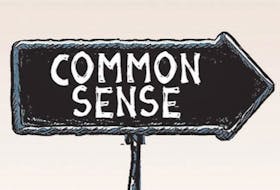By Gordon Cooke

Good governance involves putting in place inclusive, fair and transparent laws, systems and procedures, but that is not enough.
The need to discuss problems that are complicated and sensitive is sometimes overlooked. In Newfoundland and Labrador, a much more vigorous and open discussion is needed about the financial and demographic challenges facing the province now and in the future. While it would be nice to be able to afford everything that we want, or everything that we have become used to having, we have a fiscal problem that requires attention. It’s a question of choosing what we want, what we can afford, and what we have to give up, even if we don’t want to.
We are also overdue to discuss the affordability of the defined benefit pension plan that public-sector workers, and essentially only these workers, receive.
Members of political parties within this province have a bad habit of avoiding difficult conversations.
One party line is to insist that they didn’t overspend. Just because their budgets included spending at twice the rate of inflation for a decade didn’t mean overspending.
Another party line is that they thought cuts could be avoided and that they didn’t know the situation was serious until they had a chance “to look at the books.”
Another party line is to insist that the other two parties have a lack of vision.
It’s a question of choosing what we want, what we can afford, and what we have to give up, even if we don’t want to.
I would argue that the problem is the math, not the vision (perhaps a shortage of $1 billion per year). But good governance means having a role for the general public, too. I argue that, collectively, the general public has punished politicians — or others — who have tried to initiate a frank discussion of our fiscal situation.
Many of us grumble about employment insurance when we have to pay into it but do not receive benefits. What many of us fail to understand is that the ones who receive it are the ones who need it: paying in and not ever receiving it is a good thing. Unfortunately, defined benefit public-sector pensions are the opposite. Taxpayers — many of whom do not have a defined benefit pension or any retirement benefit from their employer — have to pay for a pension that that they do need but will never get. That is undemocratic.
In short, the current system could be seen as unfair because very few besides full-time, permanent members of the public sector receive defined benefit pensions, while the rest of the population (and that’s roughly 75 per cent of society) have a riskier/smaller defined contribution pension or nothing at all.
This pension gap has serious financial implications for the province, but its effects are much more than financial. This unfair polarization of working conditions, in which a privileged few receive benefits that others cannot access, was predicted two decades ago by Gordon Betcherman and Graham Lowe and unfortunately has come to fruition.
Of course, it would be nice if more members of society could receive an employer-provided defined benefit pension to augment Canada Pension Plan payouts. But, in practice, the model is for employers to provide either no (company) pension or a modest defined contribution pension. That battle has been fought and lost.
Yes, oil revenues are way down. But this problem does not go away when oil revenues improve. When governments finally decide to balance the books, and hopefully more ratings downgrades are not required to overcome inertia, public-sector workers are going to be affected. The “do nothing” option does not mean the problem is solved. It means the problem will grow. A substantial pension liability (in other words, debt) needs to be addressed. A substantial annual deficit needs to be addressed.
Good governance means that our political parties must present a plan that shows a realistic path to balanced budgets going forward, even if it creates discomfort. Similarly, members of the public have an obligation to focus on the idea, rather than questioning the motives behind the message.
As discussed by Robert Hebdon and Travor Brown, public-sector bargaining is a different beast because management negotiators must keep an eye on public opinion rather than fiscal discipline. But the time has come for public policy-makers and the general public in Newfoundland to face our fiscal deficit now; we can no longer wait for it to reach crisis levels.
Suppose that government negotiators push hard — with the expressed consent of the public — to negotiate collective agreements that wind up defined benefit pensions going forward, to be replaced with defined contribution pensions on a 50–50 cost-sharing basis. This would lessen future (and current) spending obligations. It would also give us breathing room as we wade through the much more unpalatable choices of reducing more rural services or schools, or public-sector wage cuts and layoffs.
It would also show the public that we are all in this fiscal situation together. That discussion, while uncomfortable, is long overdue and part of the price of good governance.
About the Author
Gordon Cooke (Business Administration, Memorial University of Newfoundland) studies the changing nature of work, that is, non-standard work arrangements like fluctuating work schedules, long or short workweeks, casual/on-call/non-permanent employment, and non-traditional work locations (for example, telework). He also studies the impacts of these labour market changes on subgroups of the population, such as younger vs. middle vs. older workers, and those in rural vs. urban communities. This article is an excerpt from “The Democracy Cookbook: Recipes to Renew Governance in Newfoundland and Labrador” (ISER Books, 2017).









